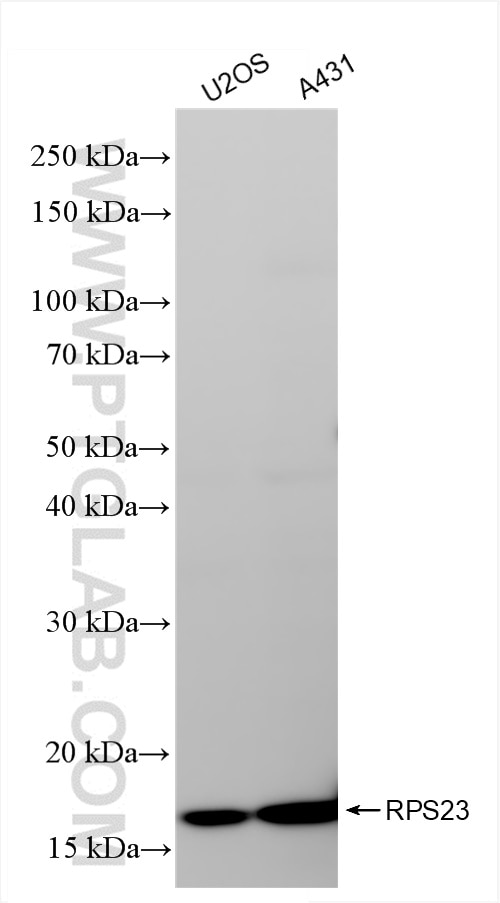Tested Applications
| Positive WB detected in | U2OS cells, A431 cells |
Recommended dilution
| Application | Dilution |
|---|---|
| Western Blot (WB) | WB : 1:5000-1:50000 |
| It is recommended that this reagent should be titrated in each testing system to obtain optimal results. | |
| Sample-dependent, Check data in validation data gallery. | |
Product Information
84560-1-RR targets RPS23 in WB, ELISA applications and shows reactivity with human samples.
| Tested Reactivity | human |
| Host / Isotype | Rabbit / IgG |
| Class | Recombinant |
| Type | Antibody |
| Immunogen |
CatNo: Ag31190 Product name: Recombinant human RPS23 protein Source: e coli.-derived, PGEX-4T Tag: GST Domain: 2-143 aa of NM_001025 Sequence: GKCRGLRTARKLRSHRRDQKWHDKQYKKAHLGTALKANPFGGASHAKGIVLEKVGVEAKQPNSAIRKCVRVQLIKNGKKITAFVPNDGCLNFIEENDEVLVAGFGRKGHAVGDIPGVRFKVVKVANVSLLALYKGKKERPRS Predict reactive species |
| Full Name | ribosomal protein S23 |
| Calculated Molecular Weight | 16 kDa |
| Observed Molecular Weight | 16-18 kDa |
| GenBank Accession Number | NM_001025 |
| Gene Symbol | RPS23 |
| Gene ID (NCBI) | 6228 |
| RRID | AB_3672068 |
| Conjugate | Unconjugated |
| Form | Liquid |
| Purification Method | Protein A purfication |
| UNIPROT ID | P62266 |
| Storage Buffer | PBS with 0.02% sodium azide and 50% glycerol, pH 7.3. |
| Storage Conditions | Store at -20°C. Stable for one year after shipment. Aliquoting is unnecessary for -20oC storage. 20ul sizes contain 0.1% BSA. |
Background Information
RPS23 (40S ribosomal protein S23), also called small ribosomal subunit protein uS12, is a subunit of the 40S ribosome and the first precursor of the small eukaryotic ribosomal subunit (PMID: 34516797). It is positioned in the decoding center of the ribosome that serves to maintain translational fidelity by monitoring the complementarity between the mRNA codons being translated and the anti-codons of aminoacyl-tRNAs (PMID: 28257692; 23636399).
Protocols
| Product Specific Protocols | |
|---|---|
| WB protocol for RPS23 antibody 84560-1-RR | Download protocol |
| Standard Protocols | |
|---|---|
| Click here to view our Standard Protocols |




